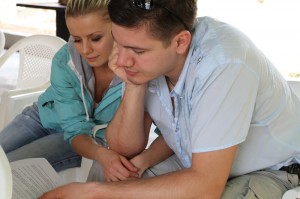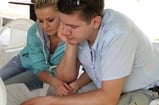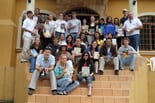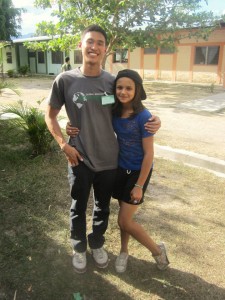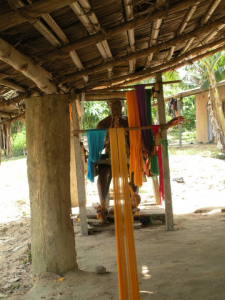| An interview with a rockstar couple from UW who last minute joined the DePaul Microfinance Brigade to see firsthand how all the brigade programs fit together to change lives. Give us a quick bit about your background. Illya – 29 year old, Russian, born in Ukraine; first moved to Texas to study and then later transferred to Seattle, Washington. Currently, owns a small consulting business and is attending his last quarter at the University of Washington with a major in Finance and International Business. Inessa – 28 year old, Russian, born in Estonia, then moved to Seattle, WA with her parents. Currently works as dental assistant and goes to school for her bachelor’s of arts degree in Fashion Design at International Academy of Design and Technology. How you first heard about MFB and what sparked your interest? I heard about an info session for Global Business Brigades from Blake Stickland and David Almeida on the UW campus. I wanted to learn more about microfinance and looked up MFB online and emailed with an inquiry. My main goal was to get some volunteer experience, learn about microfinance and help people. How did your brigade experience compare to your expectations? It absolutely exceeded it. I could have never expected to meet such a sincere group of students and staff. I was also surprised by the degree of independence that we had in choosing how to approach individual borrowers. Had you done anything like this before? No. What do you think had or will have the biggest impact on the community? Just like you said, Merrilee, nothing could motivate and encourage these villagers more than a busload of kids from all over the world telling them that they can do it. In short, my answer to this question – empowerment. They have to believe that it is possible to break vicious circle of poverty. The rest they can learn. Any advice for someone considering coming on a MFB brigade?
Just do it!
How might your Microfinance Brigade Experience impact your education? Career? Life? We worked side-by-side with Medical, Water and Public Health brigades to help Honduran villagers raise their standard of living. Global Medical Brigades identified common sicknesses in the population, which were often linked to poor water supply, sanitation, open fire stoves and dirt floors in their huts. Global Water Brigades built damns and established water supply lines for the villages. Global Public Health Brigades installed latrines, water reservoirs, smoke-free stoves and cement floors. The main goal of Global Microfinance Brigade was to establish communal banks that would allow villagers to break the vicious circle of poverty and give them an opportunity for a better life: to fund the above mentioned infrastructure improvements, to educate their children and to start new businesses or expand existing ones.
I saw the fruits of Microfinance Brigade’s previous labor, where single mothers who were starving before, now were able to finance their small businesses and live in dignity and safety, with a hope of sending their children to school instead of plantain farms or orphanages because they could not feed them.
Global Brigades emphasized need for sustainability of the changes in the communities. They were very careful not to give out handouts that could eventually turn proud and hard-working Hondurans into beggars. We could build 5 water reservoirs or cement 3 floors in the village, but time and lack of funds for upkeep and further improvements would turn them eventually into dust; whereas, change in mentality, saving discipline, access to financing and goods markets would allow villagers to fund hundreds of similar infrastructure projects on their own. This experience made me once again appreciate things that we often take for granted in the US, such as: water, electricity, safe shelter, education and most of all opportunities. Working alongside with volunteers from all over the world helped me gain hope in humanity. These 18 to 25 year old kids, my teammates, could have easily spent their Spring Break in Cancun or Miami sipping pina coladas all day on the beach and partying all night. Instead, they flew half way around the world, putting 10 to 12 hours a day to help strangers in need who don’t even speak their language. It was humble, sincere help. None of us sought public recognition or letter of recommendations from the staff. The spark of hope in the cataract infected eyes of a sugar cane farmer, gave us more then we could ever wish for – confidence that we could make the world a better place. I grew up in Ukraine during the collapse of the Soviet Union. When I graduated from high school, economic devastation was spreading throughout the country. Many remote villages of the former Soviet bloc had similar standards of living that I’ve witnessed in Honduras last month. The human suffering, hopelessness, desperation and my inability to help them numbed my heart. But, after this trip to Honduras, I know I can change the world, one village at a time. Therefore, I will get more involved with Global Brigades in Seattle. My ambition is to start Global Microfinance Brigades in the University of Washington while still in school and expand Global Brigades’ reach to Eastern Europe after my graduation. |
